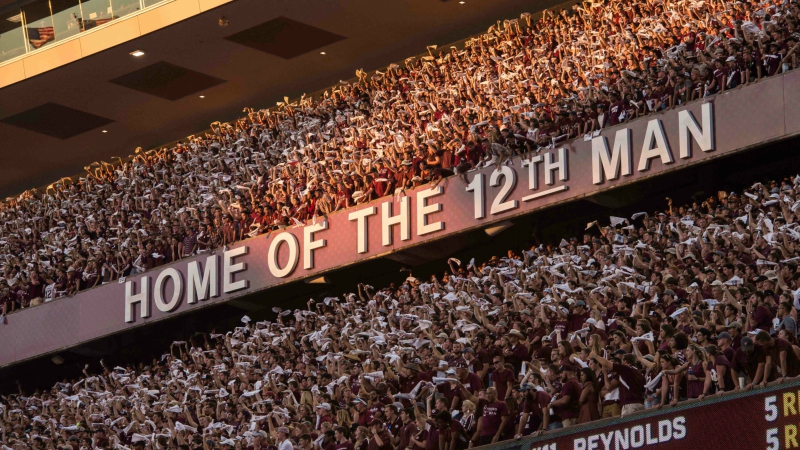Data Proves Bettors Overvalue Home-Field Advantage in College Football
Jerome Miron-USA TODAY Sports. Pictured: A view of the fans and cadets and the 12th man logo during the game between the Texas A&M Aggies and the Tennessee Volunteers at Kyle Field
- Home-field advantage is certainly a factor in college football, as home teams have won 58.9% of games since 2005.
- From a betting standpoint, Oklahoma and Wisconsin have been the most profitable teams against the spread at home.
- Overall, though, home teams have performed terribly against the spread, losing close to 500 units for bettors over the past 13 seasons.
The debate around the best home-field advantage in college football is a never-ending one. Plenty of schools could throw their hat in that ring and have a solid case.
Penn State's whiteout might make for the coolest-looking crowd every year. Washington has the highest decibel level ever recorded. The list goes on forever, and I definitely just offended some fans by leaving them off that two-school list.
But that conversation isn't really what we're here for.
What we want to know is which home fields are the best for bettors. With that in mind, here's how each FBS team has performed against the spread at home since 2005.
The top of this list seems to make some sense — at least the first two spots. Oklahoma and Wisconsin aren't easy places to play and have been really good lately, but beyond them this list is all over the place. I mean, Rice, Ohio, Temple? I wouldn't have expected those names to be rounding out the top five.
I certainly wasn't expecting to find schools such as Michigan, Georgia, Alabama, Florida State and Notre Dame all in the bottom 25%, with each losing more than 10 units at home since 2005.
With seemingly no real rhyme or reason to this list, I figured it might help to sort the schools by conference, as some are obviously viewed as having more difficult road environments. What I'm about to say might rile up some Big Ten alumni, but as a graduate of an A-10 school that didn't even have a football team, I've got no ties to any particular FBS conference. And I can impartially say the general consensus is that SEC fans are the craziest.
Anyway, here are the results.
Uhh about those crazy SEC fans …
SEC teams at home have lost almost 50 units since 2005 against non-SEC opponents, and home SEC home teams overall have lost close to 90. The Big Ten isn't much better, losing almost 30 units against visiting non-Big Ten opponents, and more than 70 overall.
So what does this say about home-field advantage?
Let's start with what it doesn't say. It doesn't say that home-field advantage is meaningless. Home teams have won 58.9% of college football games since 2005, and SEC home teams have won at an even higher rate (62.9%), so there's clearly good reason behind the SEC's reputation as a difficult conference to play on the road.
What it does say is that oddsmakers have done their part in removing any betting edge that might come from home-field advantage. In other words, you should never be placing a bet on a team with the sole reason being that you think it has a particularly tough home environment. You might, however, want to consider doing the opposite.
Simply betting on the road team in an SEC stadium has won 29.7 units for bettors since 2005 (2.7% ROI). The same strategy in Big Ten stadiums has yielded 21.5 units (2.0% ROI).
But perhaps the most striking takeaway from all of this is the number of teams and conferences in general that have negative returns in the charts above. Because there's a 10-cent juice on every game, it makes sense to expect slightly more losers than winners when sorting by any extremely general filter such as "home teams." But even accounting for the juice, these lists look to be too negative-heavy.
Sure enough, looking at the overall results since 2005 makes it clear: Home teams are the sportsbooks' moneymakers.
In this near 10,000-game sample size, betting on only visitors would've barely made a dent in your wallet. For a brief period last season, in fact, road teams actually made it back into the green, reaching as high as +18 units in mid-October.
Betting on home teams, on the other hand, has been a bloodbath. A $100-bettor would be down close to $50,000 relying strictly on home-field advantage.
Despite the horrible returns, home teams still attract bettors. Of the 9,660 games in our database, 55% have had the majority of bets on the home side, whereas only 43% have had the majority on the visitors (the others were split 50-50).
That's why oddsmakers can get away with overvaluing home-field advantage to the extent they do. They know that no matter what, bettors will flock to the team playing in front of their crazy student section. And even in cases where there's money to be made in fading that side, there aren't enough educated bettors out there to take advantage of it.
Hopefully, though, you're now one of them.
How would you rate this article?






